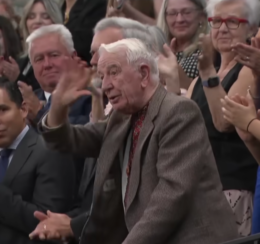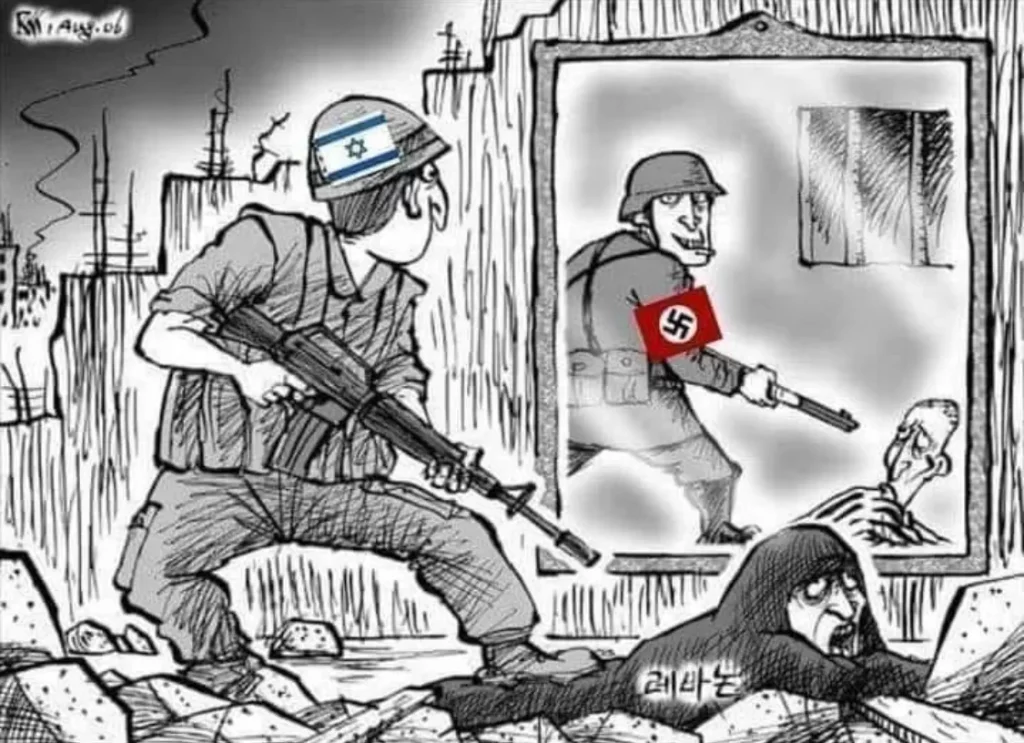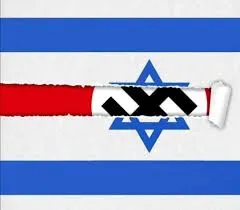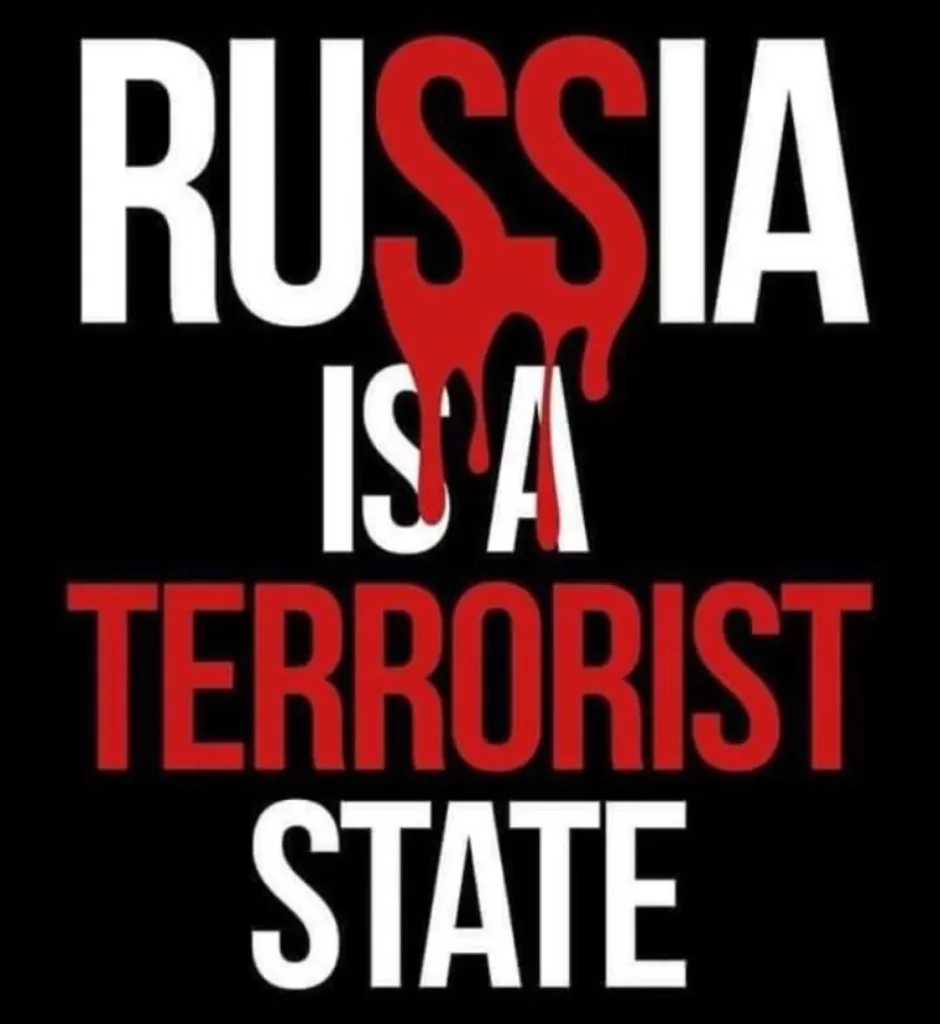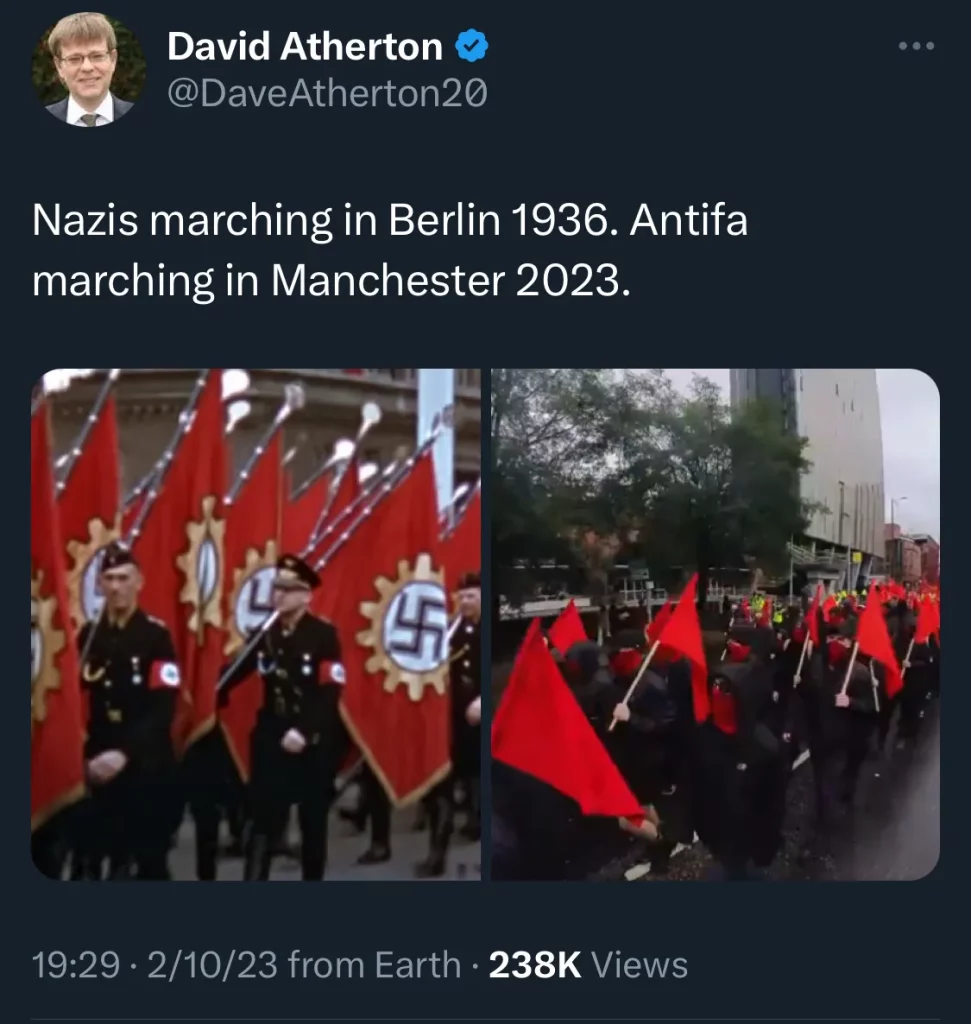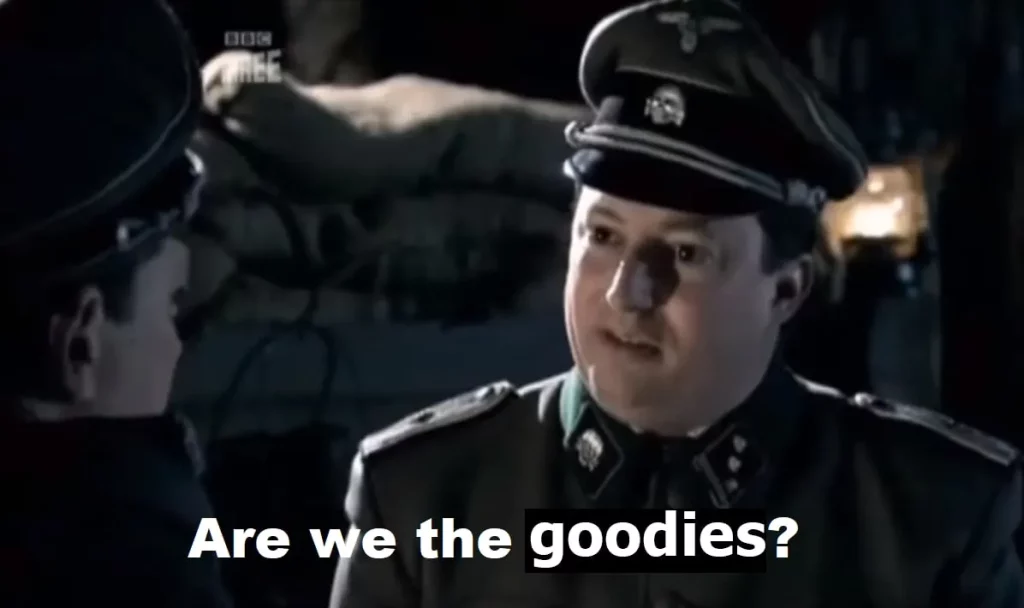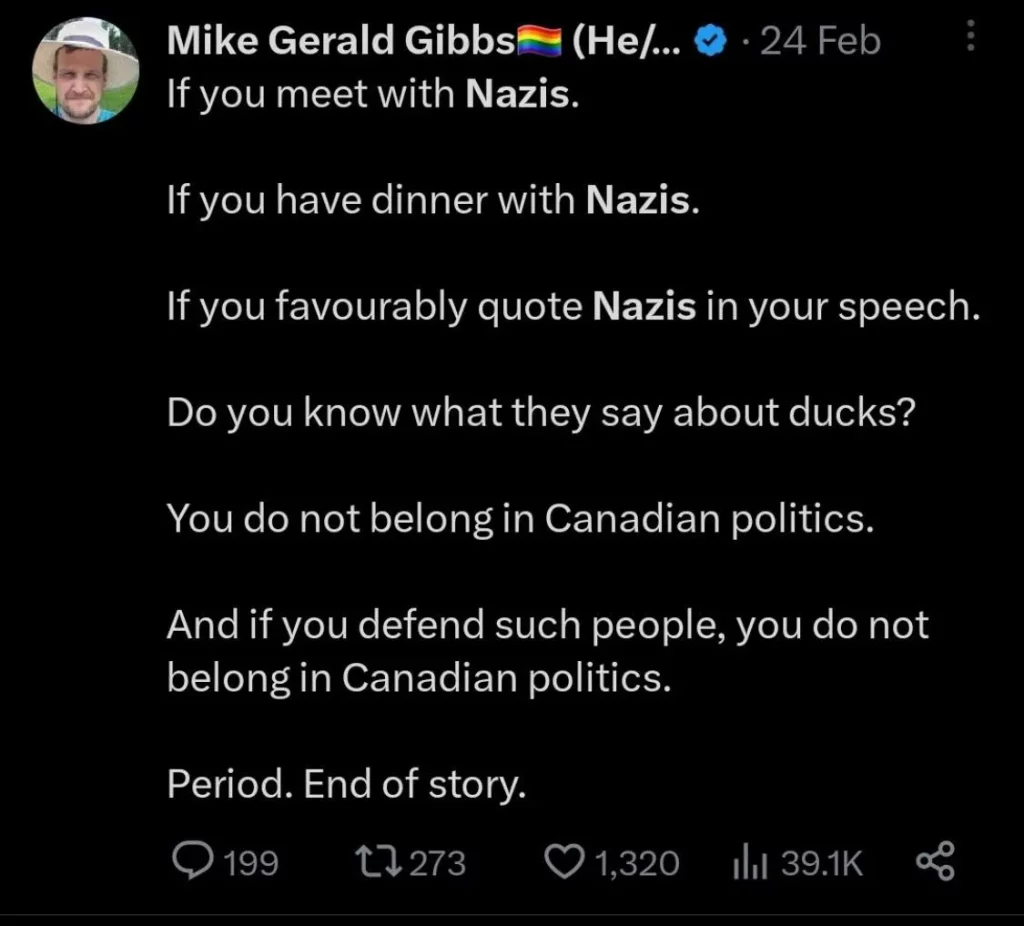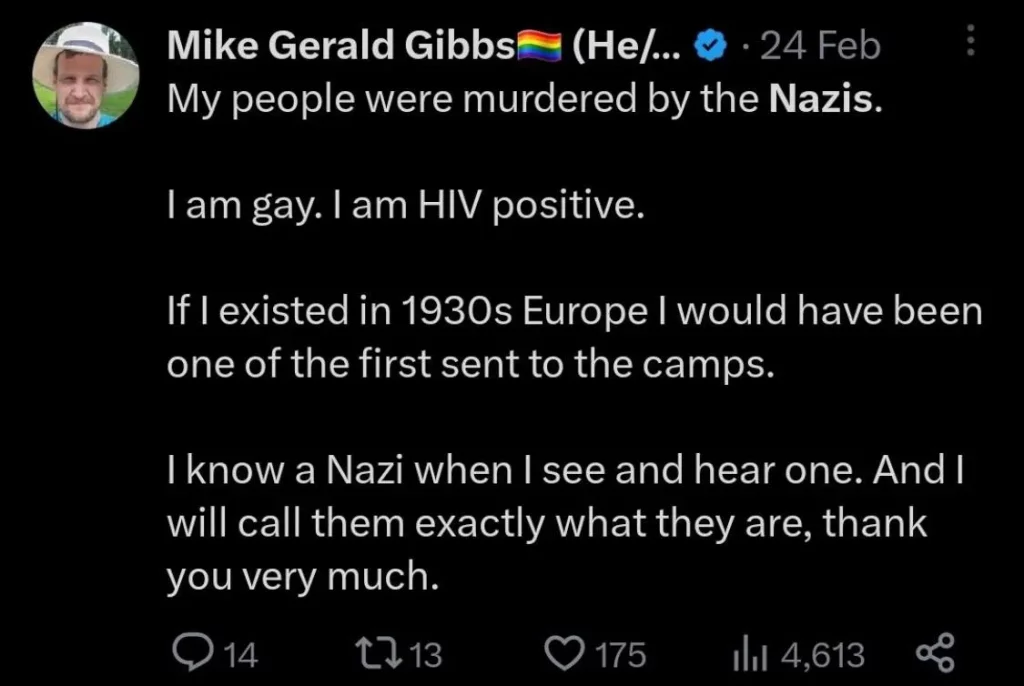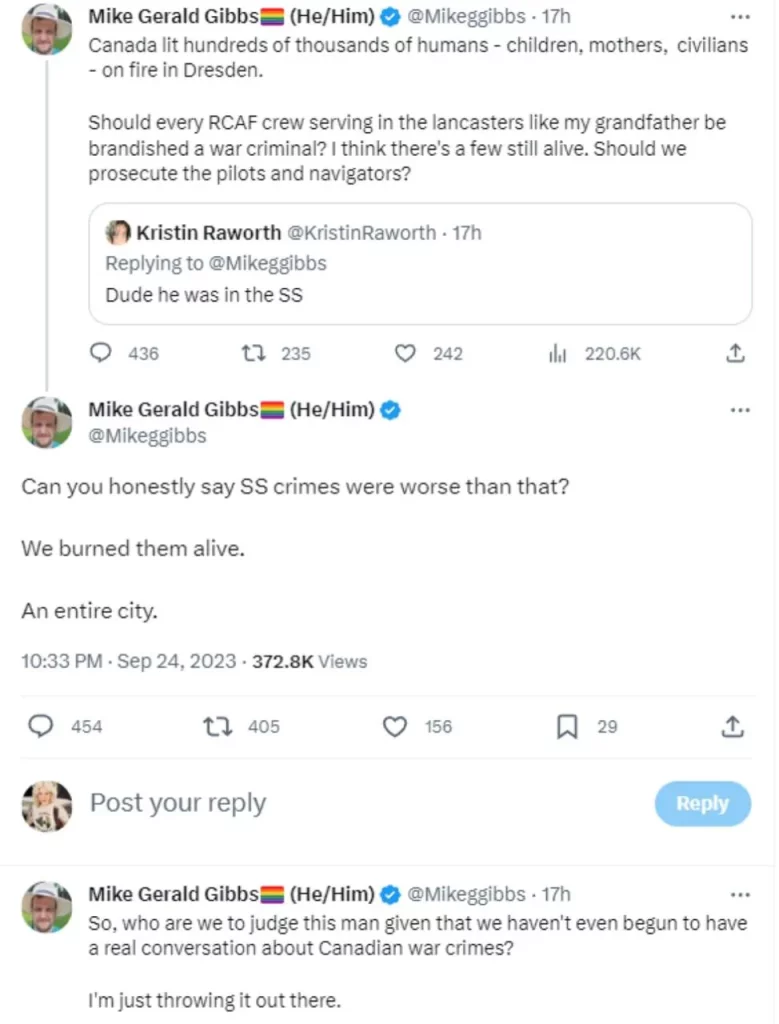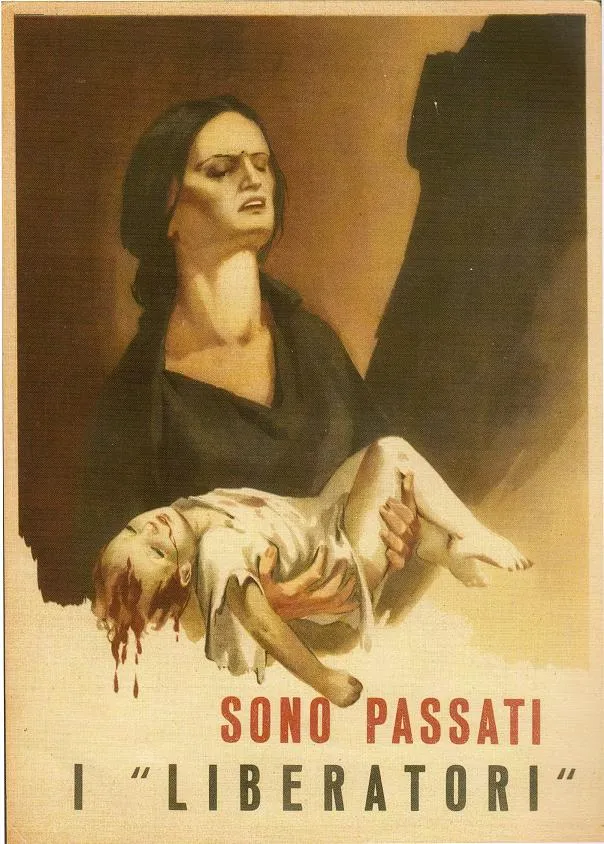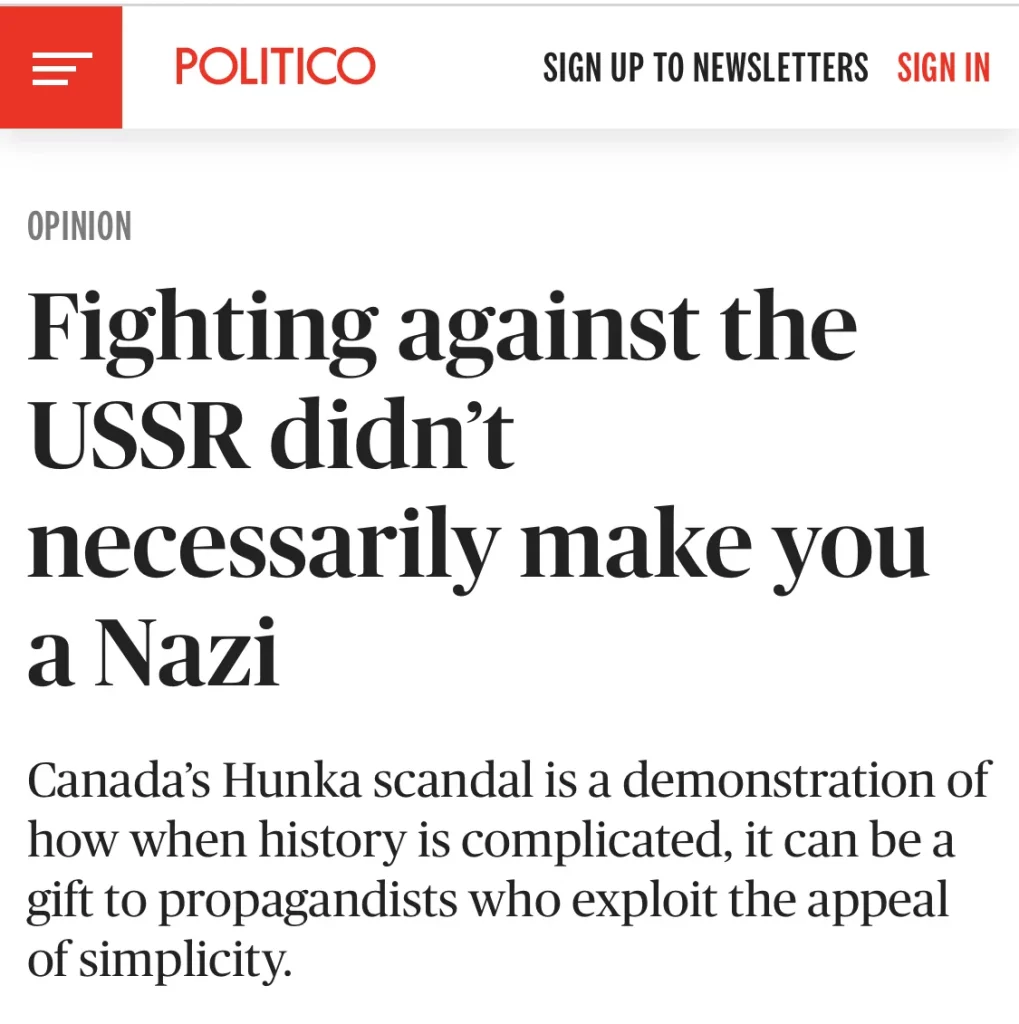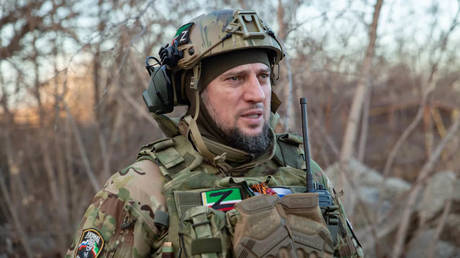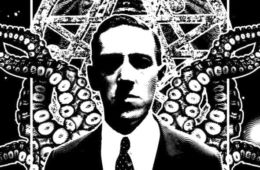What to Do about World War II, Part 1
3,456 words
Part 1 of 2
On September 22 of this year, the speaker of the Canadian House of Commons agreed to bring a special guest to the Parliament of Canada. That special guest was a 98-year-old Second World War veteran named Yaroslav Hunka.
Hunka is Ukrainian, although at the time of the Second World War his place of birth actually belonged to Poland, and after the war he emigrated to Canada. Hunka’s son Martin had asked Speaker Anthony Rota via letter if his father could be present as a guest of honor on the same day that Ukraine’s President, Volodymyr Zelenskyy, was to deliver a speech to the Canadian members of Parliament. Rota granted Martin’s request. On the day of the occasion, at one point during proceedings Rota announced:
We have here in the chamber today a Ukrainian Canadian war veteran from the Second World War who fought for Ukrainian independence against the Russians and continues to support the troops today, even at his age of 98. He is a Ukrainian hero, a Canadian hero, and we thank him for all his service.
Following Rota’s words, the MPs fêted Hunka with not one, but two standing ovations. Hunka rose to his feet as well, visibly moved by the occasion, and saluted the applauding politicians in return.
And that was that. Just another soppy and opportunistic celebration of a military veteran the likes of which we have seen so many times before. But wait! It turns out that the event was not that, for Yaroslav Hunka is not just any old Second World War veteran, as people around the world quickly discovered. Hunka had served in the SS Galizien — “SS” standing for Schutzstaffel, Nazi Germany’s preeminent paramilitary unit. Yaroslav Hunka had been . . . a Nazi. Denouncements immediately rained down from the gathering storm clouds of angry Jewish groups such as the Simon Wiesenthal Center for Holocaust Studies and countless outraged citizens on social media. Of course, the admiration bestowed on Hunka scandalized those on the far Left who love to bare their fangs at Nazis, whether they be real, imagined, or ancient, but they weren’t the only ones upset. There are MAGA types and there are Jimmy Dore types who consider Ukraine to be a nation-state crawling with Nazis. They reacted to the events in the Canadian Parliament with a mix of rote disgust and smug satisfaction. For them, it was confirmation of their appraisal of Ukraine, and confirmation of one of their most bizarre and exasperating beliefs: that “the West” itself is also rife with crypto-Nazis who rule from the shadows.
Decades of Delusion
Nearly 80 years have passed since the end of the Second World War, yet for a huge number of people, whether liberal or conservative or anything else, the “Nazis” represent not only the epitome of all evil, but also a clear and present danger today. In fact, today’s Leftists are more zealous about “punching Nazis” than the men who actually went off to fight real Nazis eight decades ago. The National Socialist regime of the 1930s and ’40s was such a monumental paradigm shift, it might as well mark the creation of a new form of calendar. There is life Before Nazis and life After Nazis. Nothing in the years Before Nazis comes close to their wicked cruelty and demented lust for power, and everything in the After Nazis years is judged by how much it approximates the Nazis’ wicked cruelty and demented lust for power. Countless people are trapped in this matrix. Conservatives and TRUTH SEEKERS who think they’ve got the world all figured out attack the Biden administration, the World Economic Forum, the European Union, the “Satanic globalists,” and whatever else gets their dander up, by tarring them all as Nazis or “fascists.”
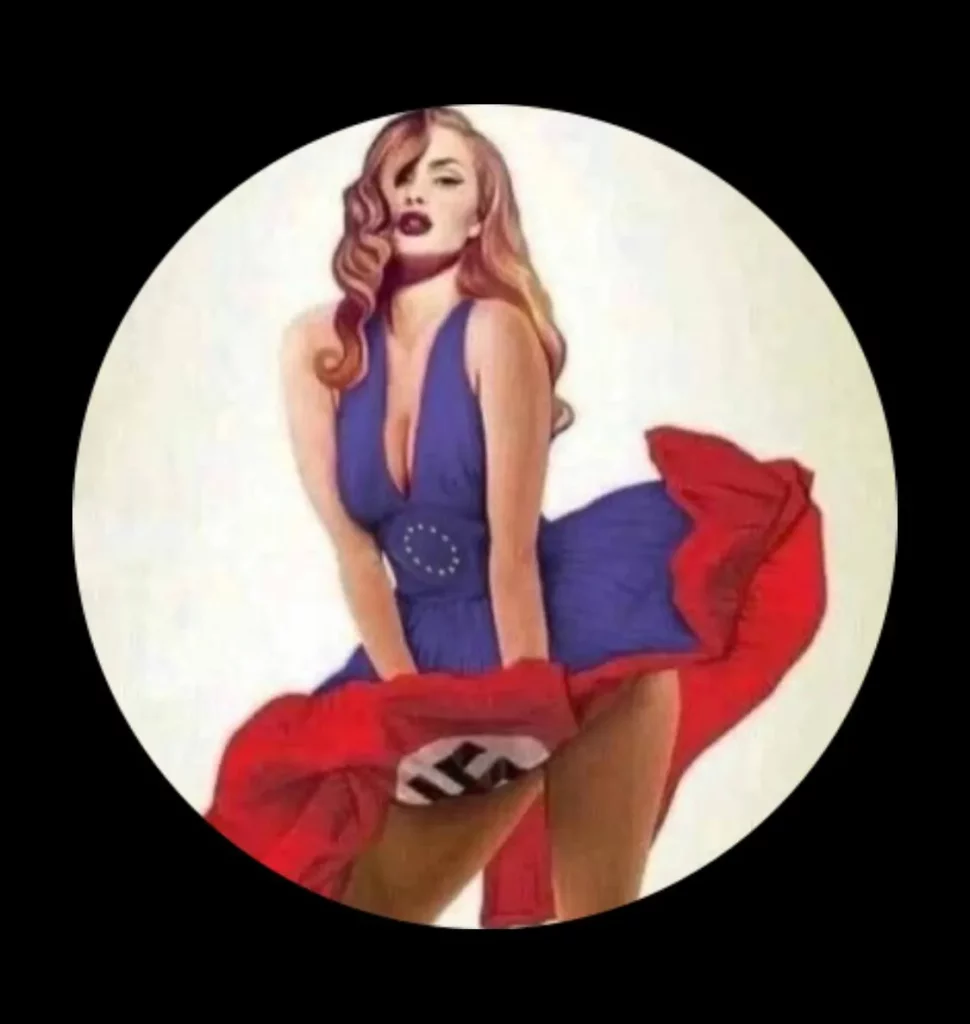
The European Union. Underneath the make-up and elegant dress, she’s just a Nazi whore, don’t you know?
Wild-eyed progressives will tell anyone with ears to hear that Ron DeSantis, Putin’s Russia, homeschoolers, anti-vaxxers, gym-goers, and meat-eaters are . . . surprise! Nazis and fascists. The excruciating stupidity reaches unbearable levels whenever the Palestine-Israel conflict rears its head. Western Leftists who are normally so eager to sniff out “anti-Semites” yet sympathize with the Palestinians find a way to square the circle by labelling Israel a Nazi apartheid state. You can’t be anti-Jewish if the Jews you’re criticizing are Nazis. Arabs, Muslims, and other supporters of the Palestinian cause who don’t give a damn about accusations of “anti-Semitism” are quick to label the Israelis as Nazis and fascists, too.
Of course, the Nazi accusations fly both ways. Conservatives who have been suckled from birth on tales of Jewish heroism and Israeli righteousness dutifully compare the Arab hordes to . . . you guessed it, Nazis. In the wake of Hamas’ October “surprise” attack on Israel, Ben Shapiro made sure his audience got the point. “These are Nazis! These are Nazis! These are Nazis! That’s what Nazism looks like! That’s what Nazism looks like!” he repeated in that fast-paced, high-pitched, nasal voice of his. Modern sociopolitical discourse is two people calling each other Nazi fascists — forever.
Those people who accuse the European Union and United Nations of being controlled by closeted Nazis never seem to pause and wonder if said institutions, with their crystal-clear intentions to turn Europe into a multiracial war-zone, really are the manifestation of “The Fourth Reich” and part of a hidden plan to continue Hitler’s efforts. They never seem to be bothered by the fact that Angela Merkel, whose unilateral decision to bring one million so-called refugees to Europe, was a member of a Marxist-Leninist youth party. They seem totally unperturbed by the fact that the institution of the European Union and the individual European countries which comprise it are full of Communists and Communist parties. Not ex-Communists or crypto-Communists; open, proud, and celebrated Communists. But it just doesn’t matter. Angela Merkel places Germany under a COVID lockdown? She’s a Nazi. Russia invades Ukraine? Fascists. Ukrainians fight back? Nazis.
In 1944, George Orwell was already facepalming at the widespread ignorance of fascism and the use of the word “fascist” as some sort of insult. He wrote in the Tribune:
[A]s used, the word ‘Fascism’ is almost entirely meaningless. In conversation, of course, it is used even more wildly than in print. I have heard it applied to farmers, shopkeepers, Social Credit, corporal punishment, fox-hunting, bull-fighting . . . Kipling, Gandhi, Chiang Kai-Shek, homosexuality, Priestley’s broadcasts, Youth Hostels, astrology, women, dogs and I do not know what else. [T]he people who recklessly fling the word ‘Fascist’ in every direction attach at any rate an emotional significance to it. By ‘Fascism’ they mean, roughly speaking, something cruel, unscrupulous, arrogant, obscurantist, anti-liberal and anti-working-class. Except for the relatively small number of Fascist sympathizers, almost any English person would accept ‘bully’ as a synonym for ‘Fascist’. That is about as near to a definition as this much-abused word has come. But Fascism is also a political and economic system. Why, then, cannot we have a clear and generally accepted definition of it? Alas! we shall not get one — not yet, anyway. All one can do for the moment is to use the word with a certain amount of circumspection and not, as is usually done, degrade it to the level of a swearword.
During the decades since Orwell wrote this, his advice has not only been ignored, the degradation and haphazard use of these terms has only got worse. But maybe, thanks to Yaroslav Hunka, things are going to change for the better.
“Who are We to Judge?”
Yaroslav Hunka’s appearance in the Parliament of Canada ended up causing quite the disaster for the Liberal Party. Justin Trudeau apologized for the the “terrible mistake,” saying, “It was a horrendous violation of the memory of the millions of people who died in the Holocaust.” (No statement on the memory of the millions of non-Jewish soldiers who died during the war was given.) Anthony Rota resigned in shame from his position as Speaker of the House. The 98-year-old veteran himself did not escape unscathed, either. Hunka, a man who fought in a unit which was investigated for committing “war crimes” and found not guilty on more than one occasion, went from living his last few days in peace and quiet, to being given a rare moment of adulation for his military service, to being threatened with extradition by the Polish government, all in a matter of days.

You can buy Irmin Vinson’s Some Thoughts on Hitler & Other Essays here.
But something else happened. A number of people — not a number anywhere near the amount of people tearing their robes and shouting “Nazi man bad!”, but a significant number of people nonetheless — began expressing, dare we say it, nuanced views about the complexity of the war, and in particular the reason why men such as Yaroslav Hunka took up arms to fight in it.
It really was a marvel to behold. Since Russia began its Special Military Operation against Ukraine and the ruling class of the liberal world order (NATO) took Ukraine’s side, Western liberals have been instructed to be ardent supporters of Ukraine and have been given permission to hate and dehumanize Russians. Whatever one’s views on the conflict in Eastern Europe, it was simply astonishing to watch white liberals transform into Conan the Barbarian, licking their lips at the idea of exterminating the Russian “orcs,” crushing them, and barely hearing the lamentations of their women over shouts of “Slava Ukraini!” These are the same white liberals who wring their hands about an Islamophobic backlash against Muslims whenever a jihadist blows up a few dozen European kids. Ukraine flags appeared in the bios of every triple-vaxxed, refugee-welcoming, Black Lives Matter-supporting, pronoun-declaring liberal on social media. Seemingly overnight, both the liberal progressive regime and its obedient toadies had turned into the most ravenous of war hawks.
As Julius Evola explained in a series of articles published before and during the Second World War and later compiled in a book entitled The Metaphysics of War, there are numerous distinctions between the ancient conception of war and the modern one. The ancient warriors fought for glory, they fought to honor their gods and their ancestors, they clashed in hand-to-hand combat, and believed that in fighting bravely — and especially in dying triumphantly (a theme which we won’t get into here, but which Evola painstakingly fleshes out) — they might ascend to a supraphysical state of being. Modern warfare is a mechanized slaughterhouse. Modern wars are fought to satiate the material desires of a merchant caste. Warriors are no longer select men of the noble classes; they are de-individualized soldiers, put on an assembly line that conveys them to their destruction. There are no more pitched battles. All modern warfare is essentially the shelling of targets, often full of civilians. Rockets, bombs, and drone strikes kill by the hundreds, with the slain rarely if ever knowing what hit them. Ezra Pound observed that “[t]he real trouble with modern war is that it gives no one a chance to kill the right people.”
This, of course, is not meant to imply that civilians in ancient times did not suffer during war. The population of any besieged city or castle whose garrison failed to defend them usually met a grim fate. Nevertheless, the excesses of modern warfare go far beyond the excesses of ancient warfare. Every conflict threatens to swell into another world war, and every potential world war threatens to go nuclear. These excesses and existential threats to all life on this planet require that war in today’s world be gussied up in moral melodrama in order to justify the annihilation of millions of lives. Instead of Palestinians versus Israelis or Ukrainians versus Russians, what we moderns really see — or want to see — are good guys versus bad guys. It’s why atrocity propaganda keeps getting more and more extreme. There is a need to excuse the use of jaw-dropping military force before the judgement of the world. One’s enemies must be utterly demonized, which in turn justifies one’s own reasons for unleashing incomprehensible destruction. War has become a spectator sport, too. “Who are you rooting for?” we ask one another, a safe distance from the carnage, ghoulishly watching and sharing videos of soldiers getting maimed and slain by drone strikes, happy to see scenes of “the bad guys’” demise.
The liberal forces of NATO have crafted a narrative that Ukraine is the good guy and Russia is the bad guy. This is only natural. Moscow has created the narrative that Russia is the good guy and Ukraine and NATO the bad guys. Both sides accuse the other of being Nazis and fascists. This is the moral melodrama at play, the game of moral one-upmanship. Again, to be a Nazi is the ultimate irredeemable evil, and against an ultimate, irredeemable evil, all is permitted in order to defeat it. And so it was that Western liberals became zealous champions of Ukraine and vitriolic Russophobes without a moment’s pause. This also explains why Anthony Rota thought he could invite a famous slayer of Russians and defender of Ukraine to the Canadian House of Commons. His ignorance of Hunka’s past, and presumably his ignorance of the Second World War, led Rota to think that Hunka was simply a man who had fought bravely against the Russians. Who today would not celebrate such a man?
When the news slipped that Hunka was a member of a crack SS division, some of these passionate liberal supporters of Ukraine suffered a moment of dangerous levels of introspection and doubt surrounding certain versions of history. If the Russians are bloodthirsty demons, and always have been, and the Nazi SS fought against them in Ukraine (which is basically a new Holy Land), then does that mean that . . .? No, surely not.
It would be an overstatement to say that these Western liberals had an epiphany, reevaluated their conceptions about the years 1939 to 1945, and became sympathizers of National Socialism and the mustachioed painter. However, there was at least a moment of nuance. Some liberals, who previously employed the tactic of hurling “Nazi” at their ideological opponents, began asking if what soldiers such as Hunka did was any different than what soldiers fighting for the Allies did.
One user of the social media site formerly known as Twitter, with a rainbow flag in his bio, went from this:
. . . and this:
.. to this:
It’s doubtful that Mike Gerald Gibbs would have asked these questions if Yaroslav Hunka had not been Yaroslav Hunka the Ukrainian hero, but instead had been Hanz Schumacher, your bog standard German. Of course, it’s beyond a shadow of any doubt that a bog standard German SS member would never be invited to the Canadian House of Commons in the first place, no matter how many Russians he had killed. But ask questions Mike Gibbs did, presumably because he — thank goodness his third person pronoun is “he” — felt duty-bound to defend a Ukrainian hero. Poor Mike was so intensely assaulted by a mob of both liberals and anti-Trudeau, anti-Ukraine conservatives that he deleted his posts which defended Hunka, or at least tried to put the war into perspective. He even deactivated his account for a while, apparently waiting for the storm to blow over.
“Who are we to judge?” he had asked, and he was not the only one. In their need to make sense of Ukrainians (good guys!) fighting on the side of Nazis (bad guys!) against Russians (very bad guys!), liberals such as Mike Gibbs had to start looking at the dreadful real story of the Second World War with different eyes and different morals. They are right to do so. Like Mr. Gibbs, many readers will be familiar with the bombing of Dresden. Perhaps not so many know that on October 20, 1944, the Allies (good guys!) dropped bombs on a children’s school in Gorla, just north of Milan. Over 200 civilians died in the school bombing; 184 of them were children. After the full damage of the Allies’ air raid on this town was accounted for, the total number of civilian deaths reached over 600. To this day, not one pilot nor official — military, political, or otherwise — has been held accountable. The demolition of the school and surrounding residential areas was deemed an “error.”
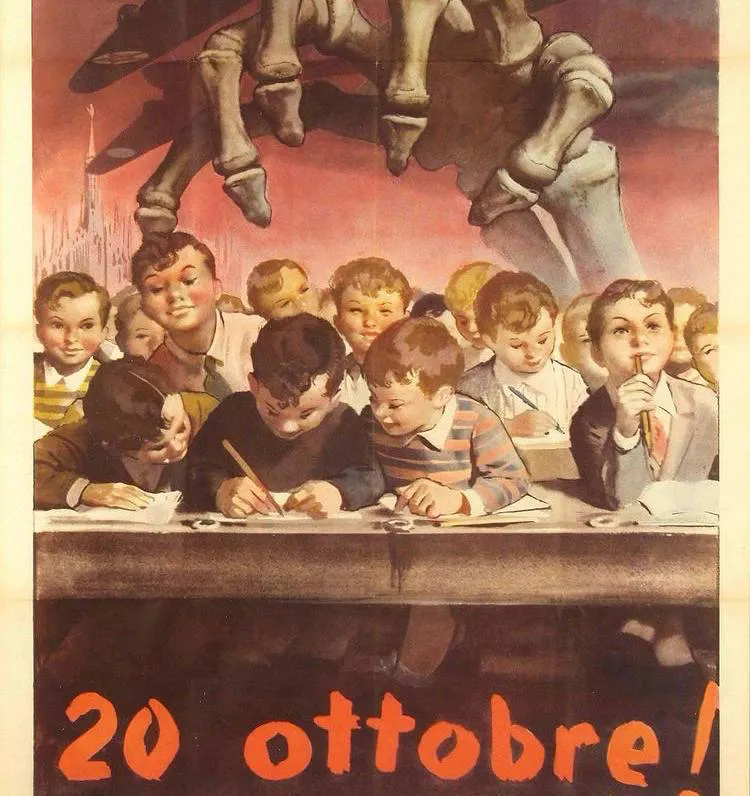
In modern war, a wayward bomb dropped by careless pilots is bound to happen. It’s nothing like the wanton slaughter of innocents and inhumane treatment of the helpless carried out by zee Germanz, right? Those who have read the book Hellstorm by Thomas Goodrich will know the purposefully untold history of stomach-churning, soul-depressing atrocities that mostly Russian soldiers committed against Germans towards, and even after the end of, the war. But it wasn’t just those Russian “orcs” who satiated their bloodlust on German women and children. After Germany surrendered, the Americans initiated a policy of starving and shooting to death German prisoners of war and civilians, too. No American nonagenarian ex-prison guard has ever been dragged out of his retirement home and put on trial for his complicity in those horrific acts. There has never been a “Nuremberg” for the Communists. If ever there was an example of might making right and history being written by the victors, the story of the Second World War is definitely it.
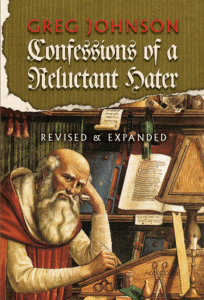
You can buy Greg Johnson’s Confessions of a Reluctant Hater here
So who are “we” to judge, indeed? And who are we to judge a soldier such as Yaroslav Hunka? He didn’t enlist in the army to kill Jews or some other nonsense reason peddled about by the preachers of the Steven Spielberg version of history. Hunka enlisted to defend his people and his patch of earth from invaders. While some Western liberals were suddenly having a conscience and a refined take on what happened during the war and the cruelty displayed by all participants in it, some others even began to express nuanced thoughts on why people fought in that war, particularly on the “Nazi” side.
After the Hunka debacle in Canada, Keir Giles, in a rare attempt by a Western journalist to give context to the history of the Second World War, wrote for Politico magazine that “history is complicated” and that “fighting against the USSR at that time didn’t necessarily make you a Nazi.” He bemoaned the “simple narratives” about the war that have become entrenched in today’s culture. He even took Jewish advocacy groups to task for launching unfounded accusations at Hunka. Unsurprisingly, however, his article is also full of obligatory descriptions of National Socialist Germany as a “terror regime,” but what is interesting is that Giles points out that the Soviet Union was a terror regime, too, and that when it comes to atrocities, “the Soviets and the Nazis had so much in common that it’s now illegal to point these similarities out in Russia.” Once again, it is worth reminding ourselves: The First World War, and especially the Second World War, represent the most gruesome excesses of the human capacity for destruction. No side came away from them with a perfect moral scorecard.
All sides committed acts of ghastly cruelty and violence, but what was it all for? It would have been nice if Giles had written a few sentences to explain why men such as Hunka had fought against the Soviets. The “simple narrative” that is the pillar of post-war Western political ideology, and that has become almost like a founding myth, a creation story for the liberal West, is that sadistic Nazis led by a lunatic art-school reject decided to embark on a mad mission of world domination, killing everyone in their path, and rounding up undesirables such as Jews and the mentally ill and murdering them in gas chambers. This was all for no apparent reason other than a period of collective insanity that lasted from the election of Hitler to the day Germany surrendered to the unblemished do-gooders from Britain and the good ol’ US of A who were fighting for freedom and to save the Jews.
What if the real story is rather different? What implications would that have for the post-war “West,” a term which nowadays is used not just to refer to the Anglophone nations of Britain and America, but also their one-time ideological archenemies such as Germany and Italy, who in defeat became subsumed by “Western values”? What effect would a reexamining of the Second World War, the reasons it started, and the reasons men volunteered to fight on the side Steven Spielberg told us were twisted villains have on the way society sees nationalism today?
Thanks to Yaroslav Hunka, a balanced view on the Second World War went widespread and mainstream in a way that does not often happen. There is ripe opportunity to address the answers to these questions. We shall do so in the second part.
* * *
Like all journals of dissident ideas, Counter-Currents depends on the support of readers like you. Help us compete with the censors of the Left and the violent accelerationists of the Right with a donation today. (The easiest way to help is with an e-check donation. All you need is your checkbook.)
For other ways to donate, click here.

